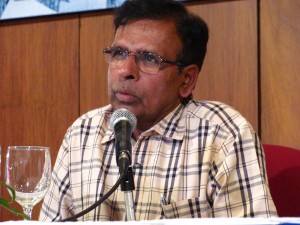
Ramon Magsaysay awardee Kulandei Francis of India shares how he helped empower women to lead their families out of poverty during a lecture Wednesday. MATIKAS SANTOS/INQUIRER.net
MANILA, Philippines—In the Tamil Nadu state of India, women are leading the way out of poverty for their families through a project of Kulandei Francis, Ramon Magsaysay Foundation Awardee in 2012.
He empowers women through his Integrated Village Development Project (IVDP), which helps displaced and impoverished people develop a means of livelihood.
“The first step I initiated was IVDP, an innovative step, with the sole aim to uplift the rural women from their lives of poverty and misery. The women were crushed by starvation, mass death of livestock, debt which resulted to loss of land and other property, and violence of moneylenders,” Francis said in his lecture paper released Wednesday.
“The women lived a life which constantly denied them of their dignity and eroded their self-confidence. They were left in a hopeless and desperate situation. They had no choice but to migrate with their children who had no other way to survive,” he said.
The IVDP’s first aims was to solve the water shortage problem of the village. It brought the villagers together to create check dams which collected water for use in irrigation, agriculture and livestock. Up to 331 of the dams were built over 22 years, significantly increasing the amount of livestock and agriculture production.
“The villagers were thrilled and elated as a result of the dependable, replenishing water
source at their disposal. It is a source of wealth available for the economic well -being of the present and future generations. A deprived village was transformed into a productive community of cultivators,” Francis said.
After the problem of water was solved, IVDP looked at helping the people get loans that could be used to improve their lives. The villagers had been at the mercy of loan sharks who would take advantage of the villagers inability to pay their debts.
“They were exploited by the private money lenders and their agents. Peasants availed loans from moneylenders for agricultural work and housing. The farmers usually mortgage their land and other property. On non-payment of loans and accumulated interests, the money lenders took away the land, house, ornaments, and cattle of the indebted villager,” Francis said.
The IVDP created Self-Help Groups (SHGs) composed of women to help them and their families “obtain the money necessary for cultivation, housing or to start any income generation activity.”
IVDP had initially created SHG for men, but it encountered numerous difficulties because the men were “disinclined to saving and unwilling to follow the procedures,” Francis said. “It was a futile effort to make the men commit to the discipline of the group. Rules were dishonored at will, hence their credit worthiness was an issue with the banks.”
“We understood that women were very sincere, committed, and they were the only one in the family who had a genuine and indisputable concern [for] the upward improvement of the family,” Francis said.
Through the SHGs, women got access to loans which helped them improve their lives. They were able to start income generating activities such as “cultivation, rearing live stocks, petty shop, canteen, selling of vegetables, fruits, opening a grocery shop, handicrafts, etc.”
Loan recovery was 99.9 percent because the money borrowed from SHGs were used to improve their income generating activities.
“Members are given the opportunity for continuous training and capacity building on maintaining financial accounts,” Francis said.
Some member are given the role of “animator” who will “take part in training the members on SHG concepts, group agreements, group enhancements, marketing, customer relations, bargaining, sanitation, etc. These trainings have helped the members gain confidence to face the challenges that are encountered by the group,” he added.
Every 250 SHGs were formed into a Cluster Level Federation and organize an office to manage and train the SHGs. To date, there are 8,231 SHGs with 150,000 members across three districts in Tamil Nadu state.
“As soon as the members start earning and contributing to the family, their self-esteem also increases. The women have started making major contributions in the family such as purchasing land, livestock, construction and repair of their dwellings, and acquisition of household articles needed by the family,” Francis said.
The success of the SHGs have shown that the poor are capable of managing their finances effectively and reliable because they are empowered to take care of their own money, he said during the lecture.
“We want to empower the women so that they can be active in decision-making at home and in the village. Through the economic and educational empowerment programs of IVDP, women are able to improve their social-cultural status in the rural community,” Francis said.